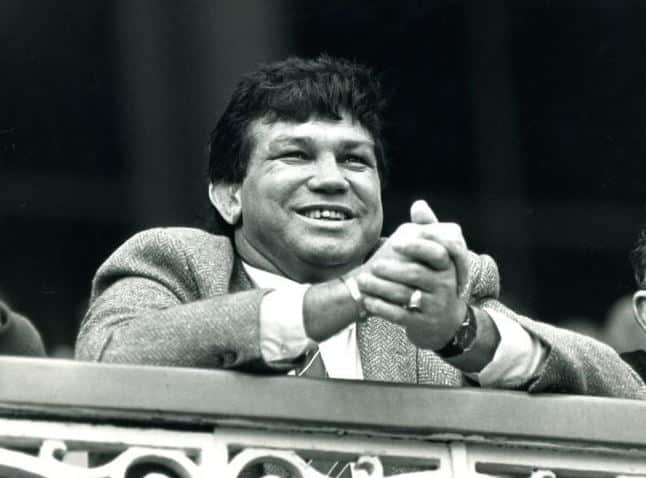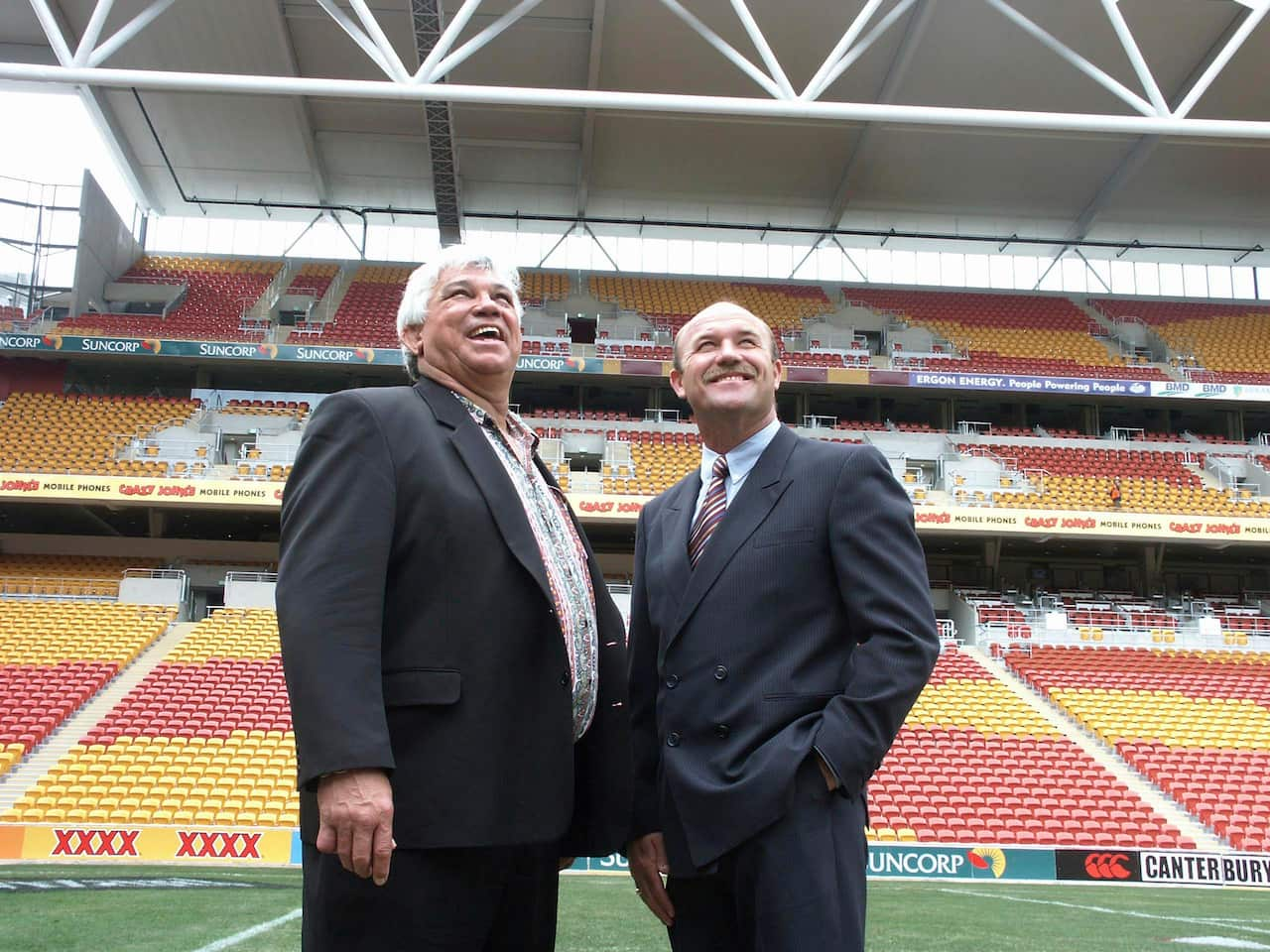The first Indigenous sports player to captain Australia in a major sport, Arthur Beetson emerged out of a sometimes rocky rugby league career as one of the eight Immortals of the game.
Arthur Henry ''Artie'' Beetson was born in Roma, Queensland, on January 22, 1945 to Bill Beetson from Brewarrina and Marie, a member of the Stolen Generations who had left Cherbourg Mission before moving to Buderim and then Roma.
After a rough education he left school at 16 and worked at the local post-office, as a clerk and a mail man.
Playing rugby league
A lover of rugby from the very start he would listen to league on the radio as a kid and watch the Sunday games before joining the local side at aged 6.
He played first grade for Roma until he was 19 as a centre and a wing and then signed by Redcliffe to join the Brisbane competition. A standout forward, Beetson was named club player of the year in 1965 when Redcliffe took out the Brisbane premiership. He was quickly signed to Balmain in the National Rugby League where he established himself as formidable on the field. Securing himself a position in the grand final team, Beetson was so impressive he was selected to play for the Australian team in his debut year in the NRL. While his tour was marred by a shoulder injury he set up two tries in the third Test, helping to secure the match.
He was quickly signed to Balmain in the National Rugby League where he established himself as formidable on the field. Securing himself a position in the grand final team, Beetson was so impressive he was selected to play for the Australian team in his debut year in the NRL. While his tour was marred by a shoulder injury he set up two tries in the third Test, helping to secure the match.

Arthur Beetson started playing Rugby League in Roma, Queensland at age six. Source: Arthur Beetson Foundation
Beetson would later captain the Kangaroos against France on the 1973 tour and continue as captain for Australia’s 1975 victory at the World Series, making him the first Indigenous Australian to captain a national team.
He was married in 1974 and working as the purchasing officer for the Eastern Suburbs Club settled down in Denistone with his wife and four year old son, Scott.
Beetson continued to play for the Tigers until 1970 and then joined the Eastern Suburbs before migrating to the Eels in 1979. Across the three teams he played 223 games, scoring 24 tries and sealing the deal with 3 premierships, including two as captain of the Eastern Suburbs. While he was forced to play with the NSW Blues, due to the team selection criteria being based upon the location of the club where the player was contracted rather than their home state, his heart was always with Queensland. A change of rules in 1980 allowed a proud Beetson to lead the Maroons to a 20-10 victory over NSW in the very first State of Origin match at Brisbane’s Lang Park.
While he was forced to play with the NSW Blues, due to the team selection criteria being based upon the location of the club where the player was contracted rather than their home state, his heart was always with Queensland. A change of rules in 1980 allowed a proud Beetson to lead the Maroons to a 20-10 victory over NSW in the very first State of Origin match at Brisbane’s Lang Park.

Arthur Beetson playing his last game for the Parramatta Eels in 1980. Source: Arthur Beetson Foundation
A passionate player, Beetson was sent off 12 times during his career, battled on and off with weight issues and racked up an impressive list of injuries, however both on and off the field he was adored by the fans and made news wherever he went.
The great League coach Jack Gibson once said Arthur Beetson could ''do it all'' on the football field and ''sell tickets'' too.
Coaching
After retirement, Beetson went on to coach the Queensland team for Origin, securing four wins from six series. After a short stint as coach of the national team in 1983, he returned to the Eastern Suburbs where he was awarded Coach of the Year for his efforts in 1987. The same year Beetson received a Medal of the Order of Australia "in recognition of service to the sport of Rugby League". He continued to coach through the 1990s for the Cronulla Sharks as well as enjoying some stints in commentary and as a recruitment officer for the Eastern Suburbs and Queensland.
He continued to coach through the 1990s for the Cronulla Sharks as well as enjoying some stints in commentary and as a recruitment officer for the Eastern Suburbs and Queensland.

Arthur Beetson was selected as the seventh 'Immortal of Rugby League in 2004. Source: Arthur Beetson Foundation
The accolades continued with an Australian Sports Medal and then a Centenary Medal and as time wore on, Beetson came to be recognised as Australia’s best ever forward. He was conducted into the Australian Rugby League Hall of Fame in 2003 and was selected as the seventh ‘Immortal’ of Rugby League in 2004. His autobiography ‘Big Artie’ was also released that year, using the name popularised by the crowds for the lovable forward.
Legacy
The was founded in 2010 in honour of Arthur Beetson by the Former Origin Greats through their Closing the Gap initiative. As a strong believer in need for young Indigenous Australians to be educated, to finish school and to be employed and an inspirational role model for many Indigenous people, Beetson was proud to be associated with the program. On the 1st of December 2011, Beetson died following a heart attack at the age of 66.
On the 1st of December 2011, Beetson died following a heart attack at the age of 66.

Rugby league legends Arthur Beetson (left) and Wally Lewis at the official opening of Suncorp Stadium in 2003. Source: AAP/Gillian Ballard
After his passing the was set up by Arthur’s sons to continue on his legacy and to continue on his two greatest passions: helping people and Rugby League.
Brad Beetson, the son of Arthur Beetson and Board Member of the Arthur Beetson Foundation said of his father’s legacy:
“Dad through his life had a passion of improving the lives of young Indigenous people, it’s great that the foundation can continue this by using his other great passion of Rugby League as the vehicle to do so.”
The Foundation has secured scholarships for Indigenous students to study at some of Brisbane’s best schools and has continued the family’s long association with the game.
The Arthur Beetson trophy was created in 2012 and is awarded annually to the winner of the Indigenous All Stars rugby league match. The Foundation was also appointed by Queensland Rugby League to conduct the annual Murri Carnival and uses the event to reach over 30,000 people with its goal of better outcomes in health, education and sport for Indigenous Australians.

